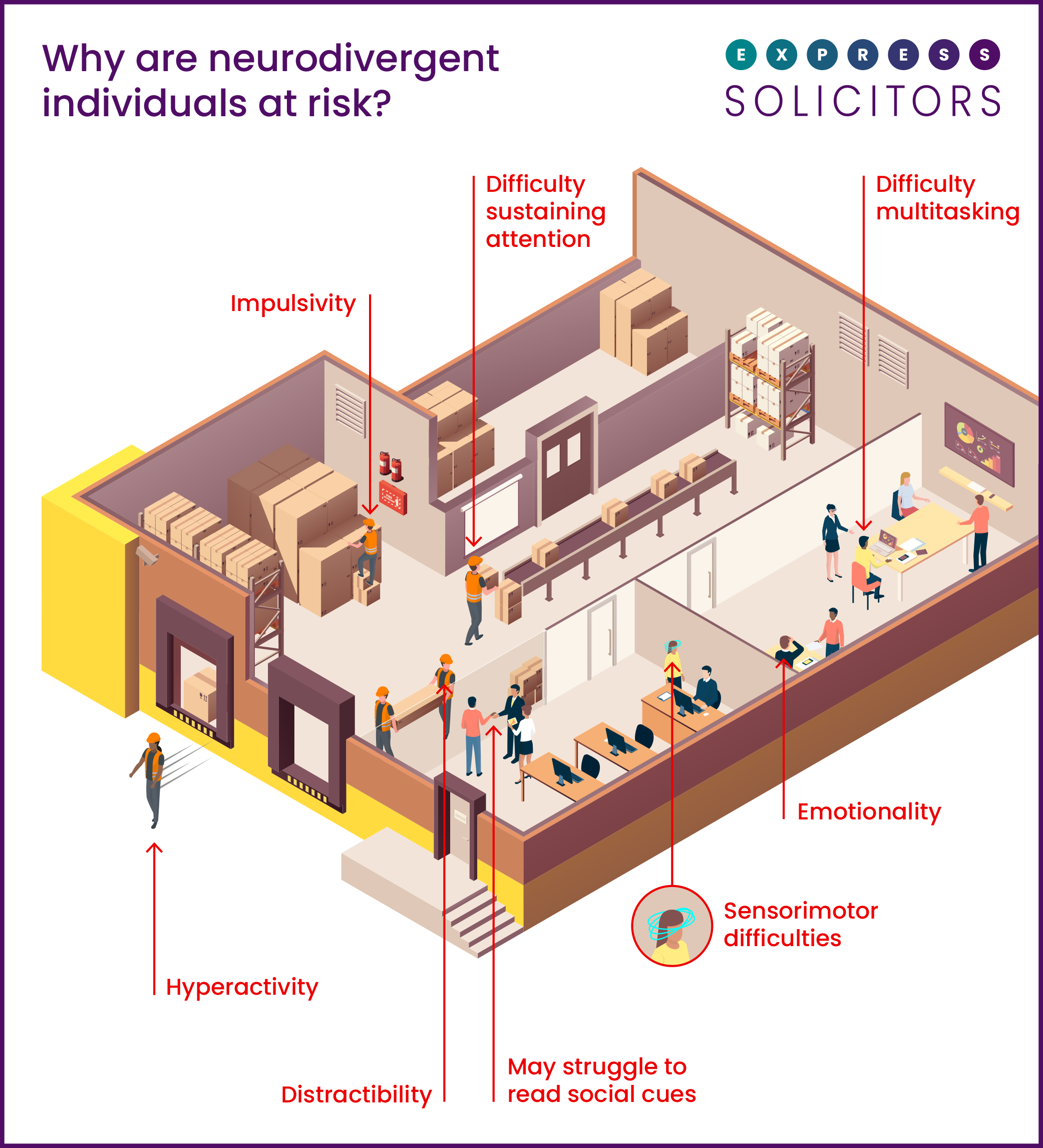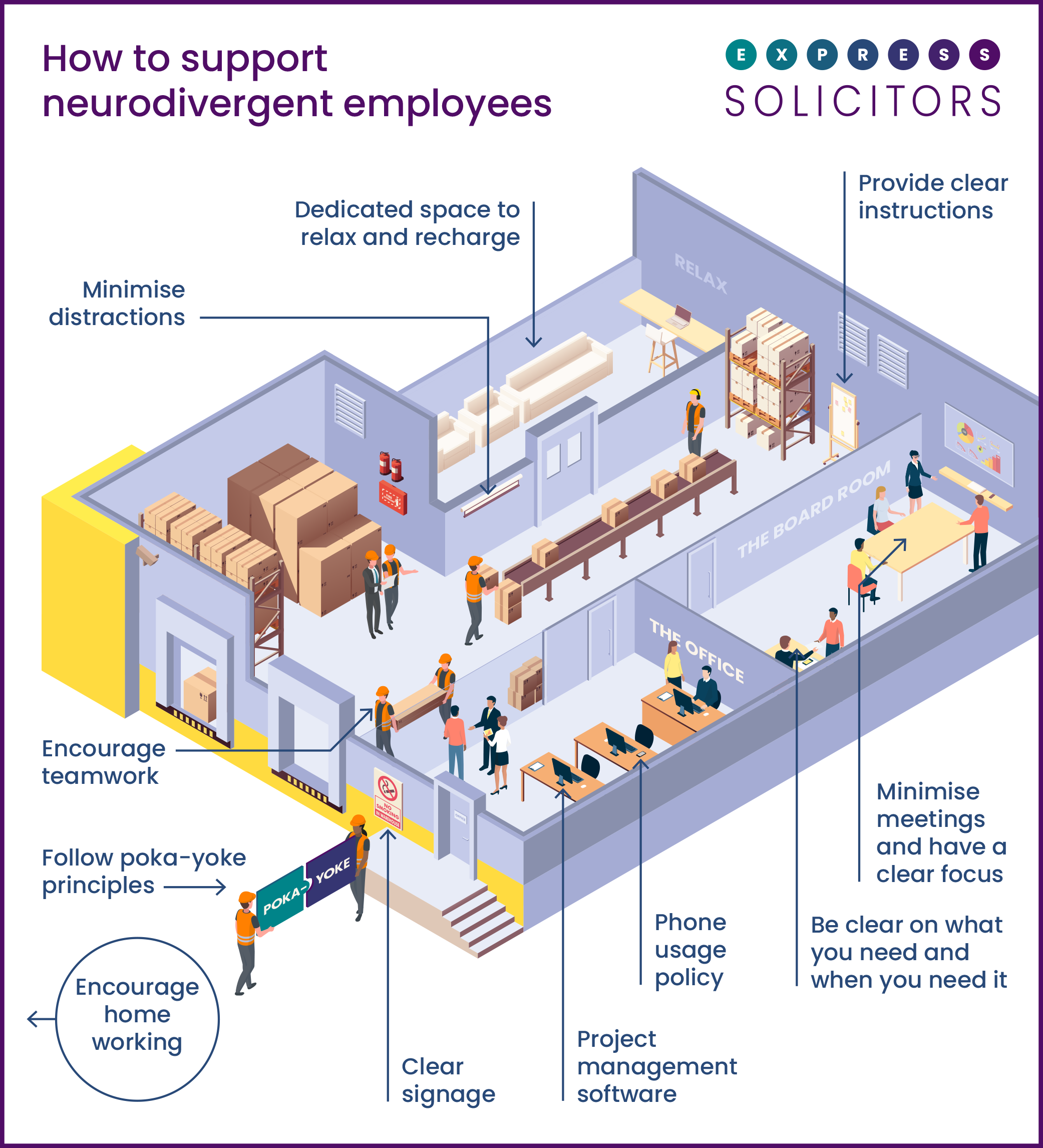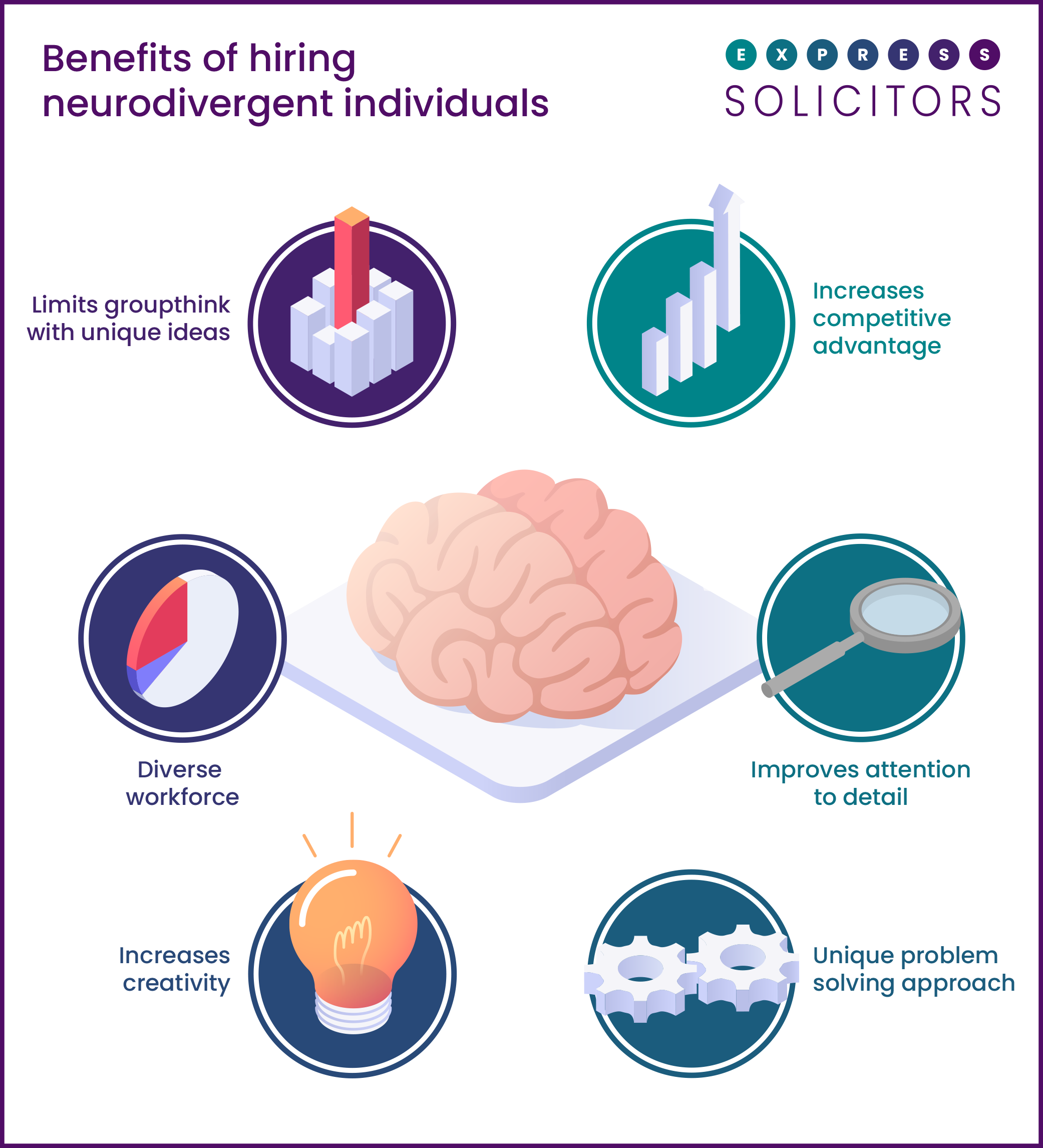Jo Cavan – GCHQ’s director of strategy, policy and engagement recently said in an interview with the Guardian: “At GCHQ, some of our most talented and creative people have a neurodiverse profile.” However, this different way of thinking can also put them at risk in a work environment through no fault of their own.
Unfairly, some employers may be concerned about hiring neurodivergent workers due to worries about accidents, productivity and performance. But by making a few small changes, both Autistic people and those with ADHD can stay safe at work – and will often prove to be invaluable team members. In addition, with the right support, they can produce impressive results and offer a unique perspective on a wide variety of subjects.
Below, we explore the risks and share our own tips for making the workplace safer, drawing from the lessons learnt supporting employees with accident at work claims for over 20 years:
Quick overview
- Recent studies have shown that neurodivergent individuals are more prone to accidents in and out of the workplace
- Both Autism and ADHD are disabilities and fall under the Equality Act of 2010
- Employers have a responsibility to consider implementing role and environmental adjustments to support neurodivergent workers
- Those who have a diagnosis of ADHD or Autism can be extremely productive, vital members of the team
- By making small adjustments and creating a safe, productive workplace, employers can benefit from a mutually beneficial relationship with neurodivergent employees
How are neurodivergent employees at risk?
Individuals who have been diagnosed with Autism or ADHD are often more vulnerable to accidents and injuries. In fact, both disorders have been linked with increased mortality rates due to unnatural causes.
Compared to employees without ADHD, individuals who have this condition are twice as likely to die before the national average age. Of those who die prematurely, in 78% of cases this is due to unnatural causes like accidents.
Helping reduce accidents and support neurodivergent individuals is critical. When JPMorgan hired autistic individuals and supported them, they found errors reduced and productivity increased compared to neurotypical employees.
To understand more we spoke with Ellie Middleton, an Autistic and ADHD activist who specialises in supporting neurodivergent individuals in the workplace.


“Neurodivergent employees are just like any other employee in your team – we come with both strengths and struggles! Yes, there are some things we find trickier in the workplace. But if you can accommodate and support us with those things, you’ll unlock a whole load of skills and abilities that make up a great employee.”
Why does being neurodivergent increase the risk of accidents?
Autism and ADHD have a profound impact on the person’s daily life, including the time while they are at work. Because these conditions can affect impulsivity and danger awareness, individuals are often at risk of avoidable accidents. Below is a summary of the reasons why neurodivergent workers may be at risk:
- Distractibility – ADHD in particular can affect the ability of the worker to pay attention to the task at hand and their surroundings. They may more easily become distracted and lose focus leading to accidents and injuries.
- Emotionality – Being neurodivergent can make individuals more prone to emotionality. Although ADHD & Autism aren’t mental health conditions themselves, living as a neurodivergent person in a neurotypical world can cause extreme distress and heightened emotions. This may make it challenging to concentrate on their work.
- Social cues – Neurodivergent people can struggle to read social cues which can affect their ability to form friendships with their colleagues.
- Hyperactivity – Hyperactivity can affect those with Autism and ADHD making staying in one position very difficult. Individuals may feel an overwhelming need to be active which can lead them into dangerous situations. They may also experience fatigue from constant activity, affecting their ability to notice risks.
- Impulsivity – When a task or scenario feels urgent or important, neurodivergent workers may make impulsive and reckless decisions that put them in danger.
- Sensorimotor difficulties – Autistic employees are especially sensitive to their environment. These individuals sense the world differently than those who are not Sensorimotor difficulties can be overwhelming, preventing workers from noticing daneurodivergent which can cause sensory overload, an exhausting, distressing experience. ngers around them.
- Sustained attention – Being neurodivergent makes it difficult to give your complete attention to a long, monotonous task. This can affect reaction times and risk detection. Employees who experience ADHD or Autism can also hyperfocus on certain tasks, forgetting to eat or drink for hours at a time. During this time, they may not notice dangers or threats.
- Multitasking – Multitasking can be very difficult for those with Autism or ADHD. Trying to keep on top of multiple tasks can be overwhelming leading to a reduction in productivity.


What improvements can employers make to support neurodivergent employees?
By making small, affordable changes in the workplace you can ensure that your neurodivergent workers stay safe and work to the best of their ability. Employers may even be able to access grants to pay for specialist equipment and adaptations.
Ellie Middleton had the following recommendations:
“I think a lot of employers push back on making more of a conscious effort to be inclusive because they hear the words “accessibility” and “inclusivity” and presume that the required changes would be expensive, complicated and lengthy. They envision having to rip up and redesign the office, implement entirely new processes and spend mountains of money on expensive software. But, in reality, most of the changes that make the biggest difference to neurodivergent people are free, quick and simple. They’re not groundbreaking – in fact, they are mostly just rooted in kindness, clarity and common sense.”
These adjustments also allow those with ADHD and Autism to maximise their performance and productivity, and you’ll likely find they have a beneficial effect on other employees too.
With over 400 staff and over 1,000 years combined experience with accident at work claims, we have helped a wealth of people and learnt a lot about workplace safety along the way. Below we’ve shared some of the changes employers can implement to create a happy work environment:
Signage
By installing safety signage and instructions for using different equipment in the workplace, impulsivity can decrease, helping neurodivergent individuals to stay safe. Visual instructions can also help to ensure information is relayed accurately.
Minimise Distractions
Distractions can affect people with Autism and ADHD and bring a risk to their safety. Taking steps to eliminate these distractions, particularly in high-risk areas, could prevent accidents and injuries from occurring. For example, those with ADHD and Autism can quickly become overwhelmed by noises, smells, and lights, which can lead to an increased risk of accidents. Minimising these can increase safety and improve work quality.
In addition you may want to consider:
- Implementing a dress code that allows people to wear clothing that they feel comfortable in
- Asking people to listen to music through headphones rather than having a radio playing loudly in the office
- Avoiding fluorescent lighting where possible and maximise natural light
Phone usage
Having a mobile phone on their desks can be very distracting for individuals with Autism and ADHD. Starting a phone usage policy can improve their focus,avoid burnout from being “always on” and improve concentration in high risk situations.
Project management software
Staying on top of their workload can feel impossible for neurodivergent workers. Using project management software to help with planning, goal setting, time management and deadlines can give your employees the tools needed to effectively manage their day.
What by when
Another great tip from Ellie Middleton is the concept of “What by When”. For each task explain:
- What exactly do you need from me?
- When exactly do you need each of those things by?
- Why do you need that from me? (this one is optional but also helpful as providing context can be useful for neurodivergent people)
This ensures tasks are easier to understand, plan for and create the right headspace to deliver great results, and reduce the risk of mistakes.
Instructions
It is very important that any instructions for tasks or equipment use are provided in a clear, concise, and logical manner. These instructions should also be easily accessible in the future whenever a task is repeated. This reduces the risk of an accident occurring through improper or unsafe use of equipment.
Home working
Many people with Autism and ADHD will find working from home beneficial, especially when it comes to reducing the distractions of a noisy office and removing the risk of accidents in an office setting. However, other individuals function more productively in a work environment.
Offering a flexible home working policy can allow workers to maximise their potential, as does having flexible working hours. Some people will prefer to work in short, intense bursts with regular breaks rather than sitting behind a desk for 40 hours a week. This doesn’t mean that they aren’t getting just as much done, as we all have our own way of achieving 100% of the work needed.
Meetings
While meetings are often essential to the running of a business, they can interrupt neurodivergent employees and hamper their performance. Keep meetings to a minimum and provide clear agendas before meetings to allow workers to prepare comments. Following up meetings with a written outline of key points and actions can ensure that people who struggle with auditory processing are still able to process information and instructions, which is vital when it comes to ensuring everyone stay safe.
Teamwork
Encouraging your neurodivergent employees to work in a team or with a mentor can help to prevent serious accidents while using dangerous equipment. We should all stay vigilant to avoid accidents, and having people work together can minimise the risk.
Dedicated space
Once neurodivergent individuals become overwhelmed, having a quiet space where they can relax and recharge can be extremely beneficial. When they return to work, they will have a clearer focus and be less at risk of mistakes or accidents.
Poka-yoke
Poka-yoke is a technique that can be used to avoid mistakes in the workplace. It involves creating the right conditions before starting a job and implementing poka-yoke techniques adds in extra checks to greatly reduce the chance of accidents. For example machinery that won’t start unless safety steps have been followed, or two parts that can only be joined in the correct way.
To learn more about poka-yoke, visit this informative website.


Benefits of hiring neurodivergent individuals
Much of the success of an organisation is determined by the strength of its workforce, and by welcoming neurodivergent individuals onto your team you can ensure that your company thrives in any marketplace.
In 2021, Sir Richard Branson stated that “The world needs a neurodiverse workforce to help try and solve some of the big problems of our time.” This quote illustrates the importance of encouraging diversity and individual thinking in your company. In fact, neurodivergent workers can offer the following benefits:
- Competitive advantage – The unique experiences and skill sets that neurodivergent individuals bring to the workplace, ensure that your company will have an advantage over competitors.
- Attention to detail – Those with a diagnosis of ADHD or Autism have the ability to hyperfocus on their work with an incredible attention to detail. This means small errors and issues are quickly noted and resolved.
- Problem solving – Problems crop up regularly in any business that may seem to have no clear solution. Those with neurodivergent brains see the world in a completely different way than other workers allowing them to find solutions that have never been considered before.
- Creativity – Creativity is the key to setting your company apart in today’s market and by hiring neurodivergent individuals you can ensure that your business has a valuable USP and the best chance of success.
- Diverse workforce – Having a variety of employees from different backgrounds is a fantastic way of diversifying your workforce. This helps to bring unique perspectives to projects and creates a positive work environment where innovation is encouraged.
- Limits ‘groupthink’ – Groupthink is a phenomenon where employees ignore their own ideas and common sense in order to conform to the group consensus. By inviting neurodiverse workers into your organisation you will ensure that individual thoughts and ideas are heard.


If you are a neurodiverse individual and have concerns about it limiting employment options or leading to other forms of discrimination you don’t have to disclose the condition. However, disclosing the condition to your employer can help them make steps to create the most productive work environment for you.
Ellie Middleton provided some excellent closing thoughts on the topic:
“If employers want to succeed in the future, they need to realise this:
Having a workforce filled with brains that work in different ways is not only the right thing to do – but the only way to succeed.
The success of the future belongs to businesses that prioritise being neuroinclusive – sharpish. We need to move hiring processes away from a one-size-fits-all approach – such as a traditional interview environment – to a flexible approach to allow the individual to prove their potential in a way that suits them. We need to offer flexibility, understanding and support to our whole workforces. We need to remember that 100% doesn’t look the same for everybody, and adjust accordingly.
The world is changing faster than ever, and our best (and only) chance of keeping up is by tapping into as many different ways of thinking as possible.
Businesses need talent that can see things from a new perspective, identify patterns they hadn’t noticed before and bring brand new ideas to the table – and that means tapping into neurodivergent talent pools.”
What to do if you have an accident at work?
When asked about this topic Damian Bradley, Partner at Express Solicitors commented: “Whether you’re neurodivergent or not, your employer has a responsibility to ensure you have adequate training and a safe work environment. Sadly, we see examples of negligence on a daily basis, which could have been avoided by using many of the tips above.”
If you are injured at work, through no fault of your own or due to an employer’s negligence, then you may be eligible to make an accident at work claim. Speak to our team today to find out more.
About Express Solicitors
Express Solicitors has over 500 employees and is ranked in The Lawyer Top 200. Its lawyers and the firm are recognised in The Legal 500 and the firm is noted in Chambers and Partners. Express Solicitors specialise in no win no fee personal injury claims, cycle accident claims and serious injury claims.
The partners of Express Solicitors are regularly featured in the news as leading authorities on personal injury law and the rights of injured people.
